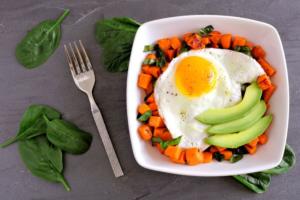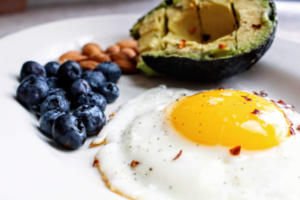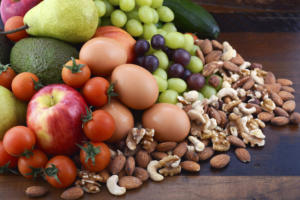Ask The Doctor: Are Eggs Healthy?
- Aren’t eggs high in LDL (bad) cholesterol?
- Aren’t eggs high in fat?
- Will fat/cholesterol in egg yolks undermine my athletic performance?
- Will eggs’ fat calories hinder weight loss?
- Are eggs a super food?
Egg FAQ:

Ad campaigns dating back to the 1970’s touted the “Incredible, Edible Egg!” as a panacea for health and vitality. Benefits like high protein and notable levels of crucial fat-soluble vitamins were enough to have most of America clamoring for daily omelettes as part of their health ritual. However, in the decades that followed, doctors and medical researchers noticed the positive correlation between high cholesterol levels and heart disease. As a result, the stellar reputation of the “Incredible, Edible Egg” as a super-food was called into question. So, are eggs healthy or not? What about all of the cholesterol? If it isn’t fat & cholesterol, what’s behind the developed world’s weight-gain?
- Question: How can eggs be healthy while containing significant amounts of LDL (bad) cholesterol?
- The Short Answer: Eggs provide key nutrients like protein & vitamins while generally having little/no effect on LDL (bad) cholesterol levels because the liver produces less cholesterol in response.

As a doctor, I can say with confidence that eggs can be a healthy food for most people when part of an appropriate nutrition plan. That said, my experience in treating patients leads me to refrain from calling anything a “super-food” because one cannot simply use a garnish of super-food as a mask to hide poor food fundamentals. Also, some people are allergic to eggs and may be more sensitive to cholesterol and/or fat-soluble vitamins. General advice cannot take the place of in-person medical care. But, to address the elephant in the room that is the cholesterol in eggs: research shows that eating 1-3 eggs per day does not usually raise “the bad (LDL) cholesterol” in the body. The reason eggs don’t normally raise cholesterol is that the body’s liver responds to dietary increases in cholesterol intake by down-regulating internal cholesterol production.
…research shows that eating 1-3 eggs per day does not usually raise “the bad (LDL) cholesterol” in the body.
According to HealthLine.com, 70% of people won’t see a cholesterol increase from eating 1-3 whole eggs per day and in some cases egg consumption may benefit our health through lower blood triglycerides. Eggs also have beneficial antioxidants such as Lutein and Zeaxanthin. It’s also worth noting that in those people that do see a cholesterol increase, the increase is often so small as to be insignificant.
In this way, the link between eggs and increased bad LDL cholesterol levels in the body simply disappears under close scrutiny.
- Question: Everyone tells me to avoid fat; so why do eggs get a pass?
- The Short Answer: Fat’s bad reputation came from low-nutrient processed foods loaded with saturated fat, trans-fat & empty carbs. In contrast, the fat & cholesterol in eggs has vitamins needed for producing estrogen, testosterone & thyroid hormone while helping to satiate the appetite.

The twin pandemics of weight-gain and heart disease put medical researchers on the search for a silent killer. Research linked fatty foods and a sedentary life lead to weight gain and heart disease. But the truth is more complicated and not all fats are created equal. Some high fat foods like eggs, avocados, olives, fish and tree nuts have been staples of humanity for thousands of years while the obesity crisis is new. So if fat has always been with us, what changed? The answer is trans-fat and processed foods packing the 1-2 knockout punch of being low in nutrients and high in calories. Processed foods are also often high in saturated fat and refined carbohydrates like corn syrup that may stimulate fat storage. The refined carbs ubiquitous in processed foods cause a boom-bust in blood-sugar that triggers the body’s fat-storing response while saturated fats pack empty calories on top. Unfortunately, these highly processed and patently unhealthy foods have led to many people avoiding all fats, to their own detriment. In short, say no to processed foods and yes to eggs, avocados, olives, fish and tree nuts.
- Question: I’m super athletic; so won’t the fat & cholesterol in egg yolks undermine all of my hard work?
- The Short Answer: Athletic people need more fats & cholesterol than normal to rebuild necessary hormone levels & for post-workout cell repair.

In my practice of naturopathic medicine and acupuncture in Portland, Oregon, I frequently see “healthy” patients with hyper-optimized diets that seek to eliminate fat, cholesterol and calories. However, going to extremes to limit the body’s fuel and hormonal building blocks can actually undermine athletic performance degrade health over time. While an athlete may prepare for a competition by temporarily going into a brief period of caloric deficit, living in a perpetual state of deprivation would cause that same athlete to lose their competitive edge as their overall health, strength and endurance erodes.
When a person doesn’t eat enough healthy fats, fat-soluble vitamins, and yes, even some cholesterol, those deficiencies translate into reduced muscle development, impaired cell repair, decreased nerve function and depressed hormone levels.
Cutting calories while working out harder worked as a beginner, so competitive people wanting to shed those last few pounds may be tempted to double-down on the strategy that worked at first. The problem is that working out is intentionally stressing our body to the point of light damage in the hope of burning off extra calories while our body rebuilds itself stronger than before. However, problems arise when the “light damage” of repeated workouts creates a larger deficit than the body can repair. Insufficient nutritional resources makes it impossible for the body to repair damage and maintain healthy hormone levels. For this reason, it’s not uncommon to see athletes come into my office with labs showing imbalanced testosterone, estrogen and improper thyroid function.
The body makes estrogen, testosterone and repairs cells using fats and fat-soluble vitamins. When a person doesn’t eat enough healthy fats, fat-soluble vitamins and yes, even some cholesterol, those deficiencies translate into reduced muscle development, impaired cell repair, decreased nerve function and depressed hormone levels. Every cell in the human body is surrounded by a cell membrane called a “phospholipid bilayer” made up of a mix of fats and cholesterol. Super low-fat diets combined with working out like crazy might give you a brief advantage, but after awhile you’re going to stop losing weight and your health and performance will begin to erode because your body cannot repair itself and produce hormones.
- Question: I’m trying to lose weight; won’t 1-3 whole eggs per day put me further from my caloric goals?
- The Short Answer: The fat & cholesterol calories in eggs are counteracted by the fact that they also keep one feeling full longer by reducing the swings in blood-sugar & insulin levels. Spiking/crashing blood-sugar/insulin are tied to weight-gain, increased cravings & diabetes.

The fat and cholesterol found in eggs provides nourishment for the body over a longer period of time as compared to low-fat alternatives. In this way, the fat and cholesterol in 1-3 eggs can stave off hunger for longer resulting in fewer total calories eaten during the day. Frequent hunger and unwelcome weight-gain are the unwelcome side-effects of a fat-deprived diet. The reason is that extreme low-fat diets create a blood-sugar/insulin boom-bust cycle where people end up hungry every few hours with a metabolism primed for weight-gain.
…super low-fat diets create excessive insulin responses that actually cause the body to store more fat.
People on low-fat diets get hungry faster and often experience a blood-sugar crash when they go more than a few hours without eating. This feeling of crashing and needing to eat coincides with unhealthy peaks and crashes in both insulin and blood-sugar. Over time, the peaks and crashes of super low-fat diets create excessive insulin responses that actually cause the body to store more fat and require one to eat much more frequently to avoid an unhealthy blood-sugar crash.
As stated in a previous section, fat got a bad name because processed foods containing chemically processed trans-fat and high levels of saturated-fat along with refined carbohydrates which are bad on all fronts. It’s a scientific fact that our bodies need fat and cholesterol, what we don’t need are trans-fat, highly processed carbs and high doses of saturated fat that are devoid of necessary fat-soluble vitamins. Logically, if the body is starved of fat then it makes sense that the body will do anything it can to store any fat it can, whenever it can. So, while skipping eggs or egg-yolks may seem smart at first, the drawbacks of going super-low-fat unravel under close scrutiny.
- Question: So eggs ARE a super food then?
- The Short Answer: There’s no such thing as a super-food. Some people are allergic to eggs or have other complicated health conditions that may necessitate limiting or completely avoiding eggs. But, when eaten as part of a healthy nutrition plan with an active lifestyle, eggs can be a great source of protein, cholesterol and the fat-soluble vitamins needed for proper hormone balance for most people.

Eggs can be a healthy food as part of a balanced nutrition plan and active lifestyle for most (but not all) people. The idea of a “super-food” is one third marketing, one third wishful thinking and one third truth. After all, there are millions of people with very unhealthy lifestyle and nutrition who eat plenty of eggs regularly. Too often when we hear that something is a super-food, we may start to imagine an economy where a kale smoothie and a few eggs will balance out poor habits. However, the trade-off for healthy/unhealthy choices would have to be more like 100/1 or even 1000/1 instead of the 1/1 trade we may prefer. In summary, eggs are a nutritionally dense, whole food that can be part of balanced nutrition for most people.
Too often when we hear that something is a super-food, we may start to imagine an economy where a kale smoothie and a few eggs will balance out poor habits. However, the trade-off for healthy/unhealthy choices would have to be more like 100/1 or even 1000/1 instead of the 1/1 trade we may prefer.
Thanks for reading and stay tuned for our upcoming article about the differences between standard, free-range and organic eggs.
Yours in Health, Dr Danielle Anderson.

